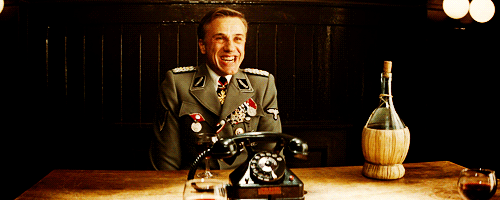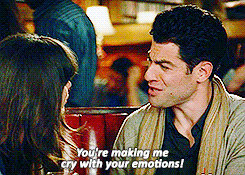I'm not quite at the stage where I'm ready to say 'Dickens! I loves him!' but I absolutely did not hate reading these first 11 chapters of Bleak House, and that is in itself, quite the achievement. I'll admit that the first couple of chapters I was kind of like 'Chancery whatnow?' and also 'the fuck is going on?' but once we got to Esther and her narrative, I was alllll over it.
Because Esther! What?! I kind of love her, am a tiny bit annoyed by her, but mostly I'm just like Esther! Awwww. Her loveless childhood becomes an adulthood where she is constantly nice to children and everyone treats her like an old woman. The dynamic between Esther-Ada-Richard reminded me of the dynamic between Marion-Laura-Walter in The Woman in White (Esther/Marion apparently being content to sit back while their more attractive/less interesting female companion gets a dude) with one really important difference:
Esther is completely in love with Ada.
I'm sure you've definitely noticed this for yourselves, but COME ON! Is there really any way in which the way Esther talks about Ada can be seen as anything BUT love? There's the point where they first meet, and Esther's all like "I'm not afraid to say 'my darling' now!" and I honestly thought she might be talking about Richard but NOPE. That was for Ada. I can't even write down all the 'darlings' and 'my sweet one's and whatever elses there are in this book (mainly because I didn't highlight them or anything...) but they are there and they are very gay. Which is awesome, and I know we're not going to get any kind of reward from the text for noticing this, but I will always know that Esther is pining for Ada. Forever.
Well, that's pretty much everything I had to say about this section, OR IS IT? (It sort of is, but I'm going to say some more things anyway). Let's do some bullet points just to be on the safe side:
- I'm not sure how I feel about the third person narrative bits yet. Or, actually, I am sure, and it's mostly 'Get back to the real story and stop being Victor Hugo-ish about this, Dickens' but I'm pretty sure they're kind of important parts so I'll try to pay better attention to them next time.
- Local interest! (For me, anyway) Esther moves from Windsor to Reading when her Godmother dies, and heyyy, I've been to both of those places! That's not a recommended move, though, I have to warn you, because Windsor is lovely (it has a castle!) and Reading is... Not so much.
- Dickens is the best at naming people ever. Mr Guppy, Mrs Jellyby, Mrs Pardiggle, Mr Turveydrop... And we're only 11 chapters in!
- Speaking of Mr Guppy... I was incredibly secondhand embarrassed for him during the whole proposal debacle (of course Esther isn't going to marry him, she loves another...) but I really felt for Esther with this: "I was in a flutter for a while and felt as if an old chord had been more coarsely touched than it had ever been." Because, because, it's difficult for her to reject love since she's known so little of it, but she can't just be like 'OK dude, I'll marry you' because that would be dishonest and make her sadder but hmph. Bad.
- I looooove Mr Jarndyce, and I love the fact that Esther thinks he's going to jump out of the window any time anyone is nice to him. I just... What a lovely man! I want to hug him and kiss him but if I did he'd probably jump through a closed door so yes. I'll just keep that one to myself.
- I found the brickmaker's speech unintentionally hilarious. He's all like 'yep, we suck, now leave us alone, woman!' I'm especially fond of "I've been drunk for three days, and I'd a been drunk four, if I'd a had the money." Wouldn't we all?
- I was fairly freaked out by the laying of the dead baby on a shelf. Because what?! That's a thing? But also, you know,
So yeah! Bleak House, we're getting on pretty well. Long may it continue.





So what I didn't have room to say in my post is that Chancery was the court that kind of formed based on disputing contracts and wills, etc, and by the mid-19th century basically stood for all that was wrong with the British legal system. Hence Bleak House. Since Dickens was all about social reform.
ReplyDeleteIT'S TOTALLY LIKE MARIAN/LAURA/WALTER, except I forgot Laura and Walter's names, because MARIAAAAN. But yeah. Absolutely. The way Richard acts about Ada and is a general idiot and like "Oh, she's beautiful when she cries" (bleah) is totally Walter-like. And Esther and Marian are both like "I love her sooooo much."
Mr Jarndyce is the best.
Dickens was all about social reform? WHAT?! (Oh wait, no, I knew that one). Thank you for teaching me, oh wise and knowledgable one.
DeleteI totally had to Wikipedia Walter's name because Marian, and basically just remembered Laura's because I will be constantly scarred by everyone going 'God, Laura's so boring and devoid of personality, isn't she?' But yessss they are the same- it's like the Victorian version of a love triangle, only they're not fighting over a boy...
I LOVE MR JARNDYCE SO MUCH ALREADY
I SAID 'SINCE' I WAS NOT BEING DIDACTIC, DAMNIT. Only about the Chancery bit.
DeleteAhahaha "I will allow a Christmas Carol to exist." How kind of you. Though I feel the same way.
ReplyDeleteI'm glad we all saw Esther's love for Ada. But really, how could you miss it. SHE LOVES HER SO MUCH.
Oh Mrs. Pardiggle and the bricklayer family. That was great. They sit there and yell at her and tell her how much they hate her and she's wasting her time and she's all "What? I can't hear you over the sound of how not-tired I am. I am so not tired. You couldn't tire me out, nosireebob. Now, why are you so poor? You should stop that. Here, let me give you my children's money."
"And this book you can't read."
DeleteThe more I think about her, the more I think I love this character in a Clack sort of way. Clack would LOVE Pardiggle
DeleteClack and Pardiggle, together at last for this very special one-time appearance: "A word on your inability to exhaust me."
DeleteAghhhh, Clack WOULD love Pardiggle. Which obviously means she's terrrrrrible.
DeleteWHY IS MRS PARDIGGLE NEVER TIRED?! I'm always tired! Such a weirdo.
I love the Marian/Laura/Walter comparision! So accurate. And the pattern sort of makes me angry at Victorian writers, but whatever.
ReplyDeleteOh, and I'm glad I'm not the only one who loved the brickmaker scene. Although it went from being hilarious to brutally ripping my heart out!
I don't know if that makes me angry- I guess it annoys me that eeeeveryone worships the pretty girl, BUT I love that it's not like two girls fighting over a guy, it's like 'heyyyy, I love this lady and I think she should marry this guy (but also I looooove her...)'
DeleteIt really did change quite quickly, didn't it?! I was like 'this guy is awesoooome' to 'what? Why?!' Poor baby.
"I kind of love her, am a tiny bit annoyed by her, but mostly I'm just like Esther!" The emotional stages of getting to know Esther, those are them.
ReplyDeleteWe agreed on so MANY things, Laura! This is a wonderful occasion. Hey, remember that part when Esther was outside and she was looking up at Ada's window, and Ada looked out at her and smiled "as if she would have kissed me from that distance." Bada-BING.
The scene at the brick-layers house was so loaded for me. Because after the Pardiggles left and Esther and Ada were being sweet to the woman who's baby died, it gave me just sort of an icky feeling. I don't know, something about Esther saying that no one could know what the poor are to each other and what a surprise it was that those two women have a close relationship. Like, surprise! The poor are people, too! It all seems very well-meaning but misguided, which makes sense because their experience with the poor is not vast.
"Like, surprise! The poor are people, too!" Yes, this. Why were Esther and Ada so surprised the woman had friends? Or people that weren't random wealthy people that wandered by to help comfort her.
DeleteMegs! It's like one mind! *makes weird gestures and connects our heads with hands or something*. And hells yeah I remember that part *winks until her eyes hurt*
DeleteYou are SO right about that part. I think I slightly blocked it because I was still on 'they left the baby on the shelf?!' but I remember reading it and going 'huh? They can't, you know, comfort each other like normal human people would do because they have no money? That's insane...' So yeah. But it's probably pretty accurate of rich people's attitudes of the time, so there's that. Damn rich people.
This is the thing, though. Because I know it's a misguided sentiment, but as an idea that needed to be heard by people like Mrs Pardiggle, I found it kind of moving. The sassy brickmaker seems like a very visible and often encountered poor-person character, and his rough sarcasm gives the loudly charitable people something to focus on and fix. But the two women show a kind of strength and goodness that Mrs Pardiggle doesn't even see, even though she's in the same room as it. Maybe Dickens just needed a scene that would make Ada cry, so that she'd look all pretty-like.
DeleteIf I'm remembering correctly, this whole scene happens after Mrs. Pardiggle sweeps out of the room, knocking over all the small objects in her wake. That's when Esther goes over to check on the baby and they find out it's dead. The Pardiggle BOYS, at the very least, might have benefited from bearing witness to that whole heartbreaking scene. But I think it could definitely be for US, the readers...and for any of the Mrs. Pardiggles among our ranks.
DeleteOooooh, you guys are so smart. Cause yeah, even though it's very patronising and separaty of the rich and poor, they're still better than Mrs Pardiggle and her way of acting all the time like she's helping without actually doing anything useful at all. VERY GOOD!
DeleteAt the end of the reading, I want you to still be like "THEY LEFT THE BABY ON THE SHELF?"
DeleteDickens names are RIDICULOUS. I love it. It's like the only way he knows to show his whimsical side.
ReplyDeleteThe third person narratives are a drag so far, but I worry that if I glaze I'll miss something that I have to know. Booooo.
I really hope there hasn't been anything important in the third person bits because I really didn't take much in from them... Except that some dude died? And some other stuff happened?
DeleteThe names are the bessssst. Long may they continue!
Authors like Dickens should not be taught in high school. I think most start off with Great Expectations, which is an awesome book, but you're right--it's HARD. BUT he can also be a lot of fun, too. My problem is I can't seem to pay enough attention to the non-narrative parts. Oops.
ReplyDeleteI can't wait for you to meet Grandpa Smallweed. He's my favorite YOU BRIMSTONE BEAST! :)